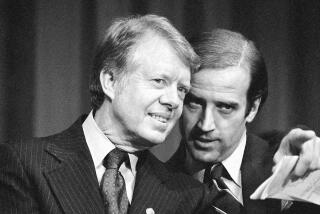Lessons From the Last Campaign of the 20th Century?
- Share via
WASHINGTON — It was an election few Americans considered memorable until it went into overtime -- at which point it became unforgettable. The race for the White House began as early as any presidential contest in American history -- with some Republican candidates campaigning back in as early as 1997. And it took as long to resolve as any presidential election since 1876. The first votes were counted in the snow of Iowa and New Hampshire; the last weren’t counted until snow covered both of those states again.
In between, George W. Bush, Al Gore and the challengers they left by the wayside struggled to master a complex political landscape defined at once by intense dissatisfaction with Washington’s gridlock and acrimony, and by remarkable contentment about the country’s direction amid the longest economic boom in U.S. history. These contradictory, contending forces -- the sense that America works and Washington is broken -- battled to a draw, with the race for the White House splitting the country almost exactly in half around the central question: Change direction or stay the course?
With voters dividing along familiar cultural and partisan lines -- and with the two nominees trading charges that have been common in virtually every election since the New Deal (Gore labeling Bush a tool of the rich; Bush labeling Gore an acolyte of big government), this was more the last campaign of the 20th century than the first campaign of the 21st. The candidates said surprisingly little about the changes being forced upon the workplace, the home and the family by the global computer and communications revolution. The campaign drew more of its heat from cultural divisions left over from the 1960s; in some ways, it owed more to the Age of Aquarius than to the Information Age.
But like all presidential elections, this campaign gave America a portrait of itself. This breathtakingly close contest taught the nation some important lessons about the state of the two parties, the cultural fissures dividing the electorate and the glitches in the election system. Among them:
1. The election system is rusting: In the struggle over Florida, Americans received a closer look than ever at the mechanisms by which the most powerful nation on Earth counts votes. And they didn’t like what they saw. From hanging chads to dimpled ballots to partisan favoritism in the handling of absentee ballot applications, Florida’s voting system wrinkled under the spotlight.
No one had any illusion that other states would have fared much better under such scrutiny. The debacle of Florida’s long count produced a glum consensus: The American election system isn’t built for a race this close. One legacy of Campaign 2000 likely will be a drive to upgrade voting technology around the country.
2. The campaign finance system has collapsed: Like a river overwhelming a dam, an inexorable tide of money once again flooded presidential politics. The public financing system established after Watergate to prevent the nominees from pursuing private donations during the general election no longer functions even as a fig leaf.
The candidates now run parallel campaigns: One, in their formal campaign, funded by the public money they receive; and a second, channeled through the national parties, funded through hundreds of millions of dollars in soft money. In essence, the candidates take the public financing without returning to the voters the other half of the bargain: an agreement not to pursue other sources of money.
3. The parties are at parity: No election since the late 19th century -- and perhaps none ever -- has ended this close to a tie on so many fronts. For the first time since 1881, the Senate will be evenly divided between the parties. Gore’s 300,000 vote lead was one of the smallest margins ever; Bush’s 271-267 victory in the electoral college was the second narrowest in American history. And the Republican majority in the House is one of the smallest in the past century.
4. Bush takes office with a narrow base: Bush squeezed out his victory by consolidating almost all of the culturally conservative Southern and Mountain West states. But he enjoyed very limited success in his larger goal of expanding the Republican base. In particular, Bush made only small inroads in the socially moderate Northeastern, Midwestern and West Coast suburbs that represent the critical battleground between a GOP dominant in rural areas and a Democratic Party that rules urban America. Attracting more of those suburban voters, while holding his core conservative base, is the primary political challenge facing the new president.
More to Read
Get the L.A. Times Politics newsletter
Deeply reported insights into legislation, politics and policy from Sacramento, Washington and beyond. In your inbox twice per week.
You may occasionally receive promotional content from the Los Angeles Times.










